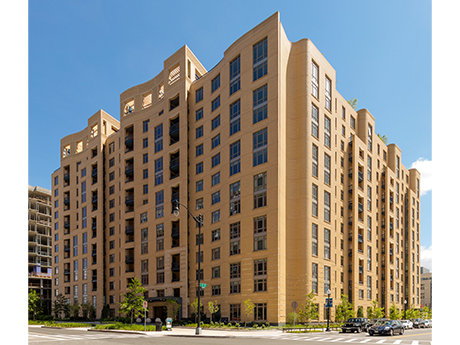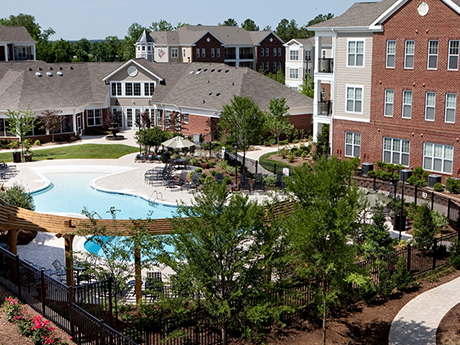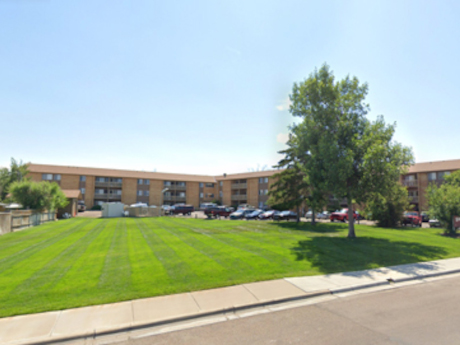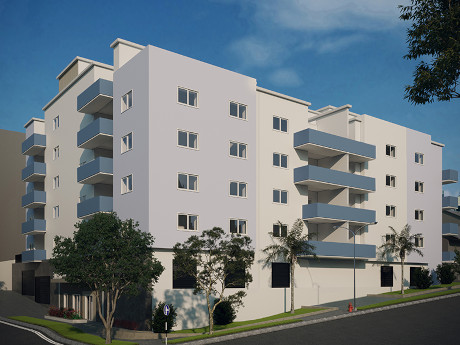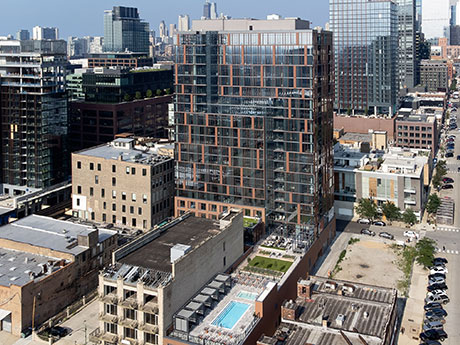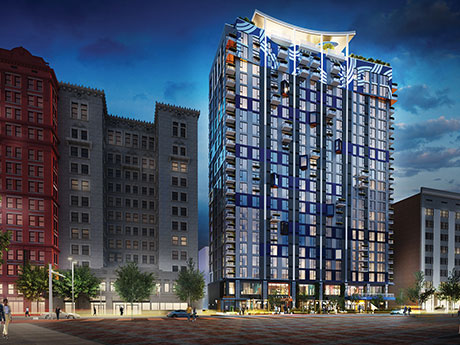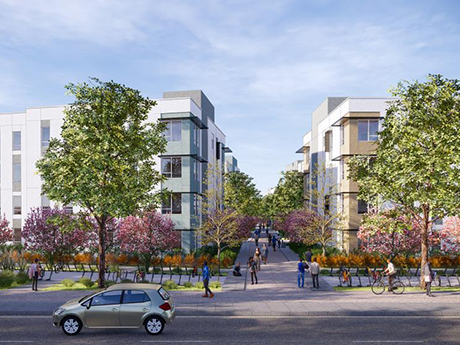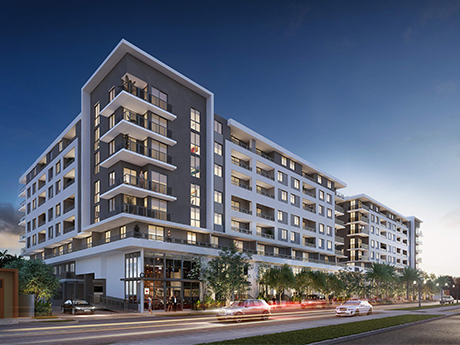WASHINGTON, D.C. — Walker & Dunlop has provided a $108.8 million Fannie Mae loan for the refinancing of Park Chelsea, a 429-unit apartment building located in Washington, D.C.’s Capitol Riverfront neighborhood. The borrower, WC Smith, developed the property in 2016 as the first phase of The Collective, a 1,138-unit apartment development. Brendan Coleman and Connor Locke of Walker & Dunlop originated the financing. Park Chelsea’s amenities include a leasing center, 24-hour concierge, club room/game room, library, conference room and a garden room. Additionally, residents of The Collective have access to amenities across all three phases of the project, including indoor green space with an amphitheater, a full-size basketball court, outdoor singles tennis court and coworking space.
Multifamily
CBRE Investment Management Acquires Legacy at Wakefield Apartments in Raleigh for $79.9M
by John Nelson
RALEIGH, N.C. — CBRE Investment Management has acquired The Legacy at Wakefield, a 369-unit, garden-style apartment community located at 14411 Calloway Gap Road in Raleigh. The seller and sales price were not disclosed, but Triangle Business Journal reports the property traded for $79.9 million. Legacy at Wakefield features one-, two- and three-bedroom units, as well as a 24-hour fitness center, dog park, grilling stations, a fireplace lounge with screened veranda, clubhouse, a car wash center and 684 parking spaces.
Community Preservation Partners Acquires Two Affordable Seniors Housing Communities in Great Falls, Montana
by Amy Works
GREAT FALLS, MONT. — Community Preservation Partners (CPP) has acquired two affordable seniors housing communities in Great Falls: Sunshine Village and Broadview Manor East & West. CPP plans to renovate both properties, and has partnered with The Hampstead Cos., which will be the owner and co-developer. This is the second project closing in Montana for CPP and Hampstead together, totaling three communities in the area. CPP and Hampstead’s total development investment is approximately $23.1 million, which includes the purchase price of $10.8 million and an estimated renovation cost of $72,850 per unit. The properties’ HUD subsidy was set to expire, but with CPP and Hampstead’s involvement the homes will now remain affordable and prevent displacement of residents earning up to 50 percent and 60 percent of the area median income (AMI) until 2074. “New affordable housing developments in the Great Falls area have significant waitlists, so the preservation and modernization of the existing affordable housing stock is important to the residents of this community,” says Karen Buckland, vice president at CPP. Built in 1979, Sunshine Village features 72 one- and two-bedroom units in a single three-story building. Also built in 1979, the Broadview Manor properties offer three- and four-bedroom units. …
LOS ANGELES — JLL Capital Markets has arranged $16.7 million construction take-out financing for The Hobart, a mid-rise multifamily property in the Koreatown submarket of Los Angeles. Chris Collins and Brad Vansant of JLL Capital Markets’ debt advisory team secured the two-year, floating-rate loan for the borrower, Jannone Development. Built in 2023, the community features 39 one-, two- and three-bedroom floor plans ranging from 877 square feet to 1,424 square feet. The property is located at 3050 W. 11th St.
CHICAGO — Greystar Real Estate Partners LLC has opened One Six Six, a 223-unit luxury apartment building rising 21 stories in Chicago’s Fulton Market district. The developer is hosting a grand opening celebration Thursday, Aug. 10 with local businesses such as Goddess and the Grocer, Levain Bakery, Pour Souls Cocktail Club, Dipsy Desserts and Tucker Pups. Local band The Holy Cows will provide live music and entertainment. Located at 166 N. Aberdeen St., One Six Six features studio, one- and two-bedroom floor plans along with three-bedroom penthouses. The building features a third-floor amenity level with an indoor private dining room, coworking space, entertainment lounge and fitness center. The 5,650-square-foot outdoor area includes a pool and spa, outdoor kitchen, lounge areas and a dog agility course. The 14th-floor sky garden features an outdoor lounge with a beverage station and views of the city. Monthly rents start at $2,040. Residents can now earn up to two months of free rent, according to the property’s website. The property has earned two Green Globes, part of a certification system developed by the Green Building Initiative that evaluates environmental sustainability, health and wellness and resilience of all types of commercial real estate.
NEW YORK CITY — JLL has arranged the $10.8 million sale of two apartment buildings located at 175-177 East Third St. in Manhattan’s East Village. The five-story, walk-up buildings house a total of 20 one-bedrooms units, two of which have been duplexed with the basement. Hall Oster, Teddy Galligan and Guthrie Garvin of JLL represented the seller, an undisclosed private investor that owned the buildings for 30 years, in the transaction. The buyer was Lockhill Properties.
By Jamie Dunford, CBRE Outside of office product, Cleveland and Northeast Ohio haven’t historically been of interest for most out-of-town multifamily developers and investors. They viewed the region as a tertiary or secondary market with a declining population and a lackluster economy. Until recently, urban living in the central business district (CBD) and surrounding neighborhoods was rare — Cleveland was a commuter city with a strong office market from the 90s until the Great Financial Crisis (GFC) in 2008. At one point in time, Northeast Ohio boasted one of the highest concentrations of Fortune 500 companies with headquarters or other office space in the region, and the CBD had the largest job hub in the state of Ohio. Most office buildings in the CBD were owned by institutional capital or national developers. However, the GFC vastly altered this landscape as unemployment rose, companies left or downsized, and many office assets went back to the lender. This left an oversupply of office product in the market, and the older buildings suffered the most. However, this created a market opportunity that Cleveland developers seized, and the city eventually became a national leader in converting historic office assets to multifamily while taking advantage …
Michaels Student Living Completes 1,549-Bed Orchard Park Residence Hall at University of California, Davis
by Amy Works
DAVIS, CALIF. — Michaels Student Living has completed Orchard Park, a 1,549-bed residence hall developed through a public-private partnership with the University of California, Davis and the Collegiate Housing Foundation. The development spans 11 buildings, offering 613 units for graduate students and students with families. The community also includes indoor amenity spaces, two community centers and programmed outdoor space. This property is the second phase of development for the public-private partnership, following The Green at West Village, a nine-building community offering 3,290 beds.
COLORADO SPRINGS, COLO. — Berkadia has arranged the financing of a 72-bed memory care facility in Colorado Springs. Jay Healy and Andrew Lanzaro of Berkadia Seniors Housing & Healthcare secured a $14.4 million bridge loan to retire the existing construction debt and transaction costs. Berkadia Seniors Housing & Healthcare was able to offer an 18-month, floating-rate, bridge-to-HUD loan to allow the borrower enough time to continue improving NOI to a level that will support a HUD refinancing. Berkadia Seniors Housing & Healthcare anticipates submitting the HUD application within 12 months. The Washington-based borrower completed the community in 2018 and, despite strong lease-up velocity in 2019, struggled throughout much of 2020 and 2021 due to key staff turnover and multiple COVID-19 lockdowns. Occupancy hit a low point of 30 percent in December 2020 before new facility-level leadership stepped in to stabilize the community, managing to increase occupancy to 72 percent by March 2023.
HOLLYWOOD, FLA. — The Calta Group has broken ground on Revv, a 180-unit apartment community located at 2233 Hollywood Blvd. in the South Florida city of Hollywood. The property represents the first multifamily project for the Coral Gables, Fla.-based developer. Calta purchased the 1.6-acre site last year for $9.5 million and obtained a $60 million construction loan from BridgeInvest in April. Designed by Miami-based Borges Architects + Associates, Revv will rise eight stories and feature studios, live-work units and one- and two-bedroom apartments. Amenities will include a resort-style pool, coworking space, gym and ground-floor retail space. Calta plans to deliver Revv in the first quarter of 2025.


